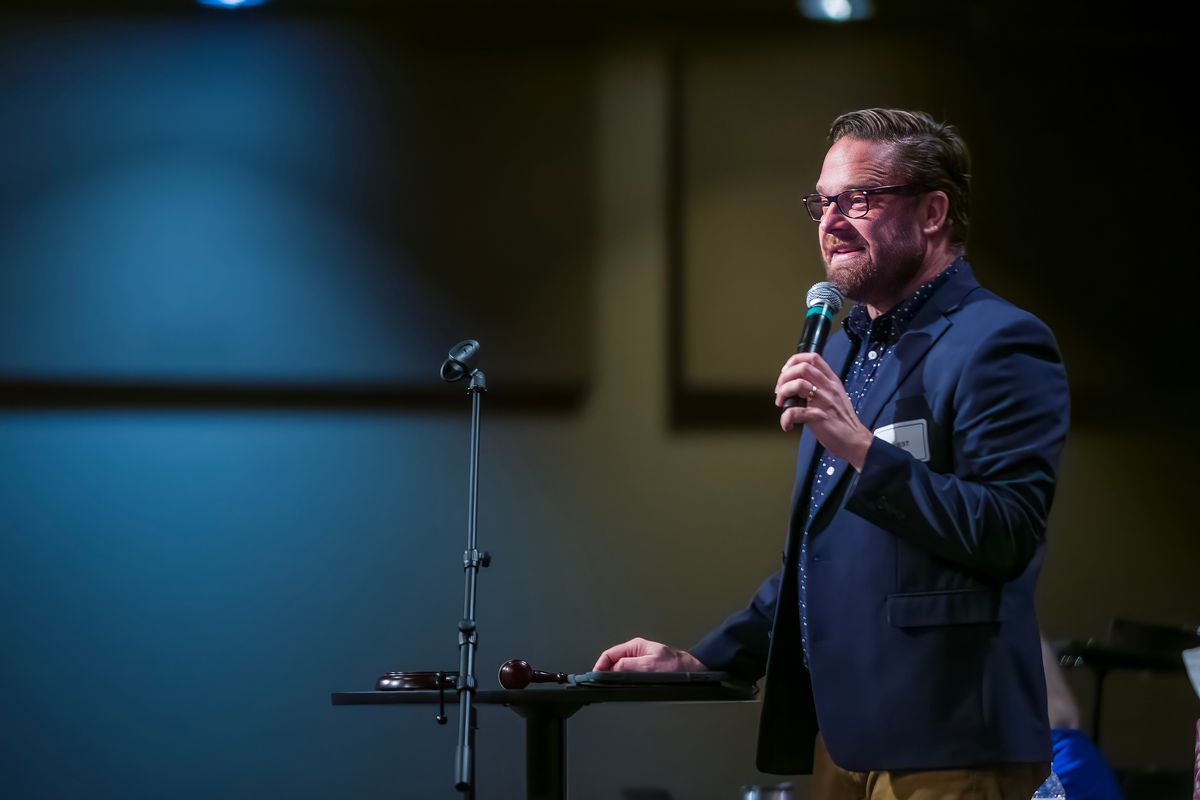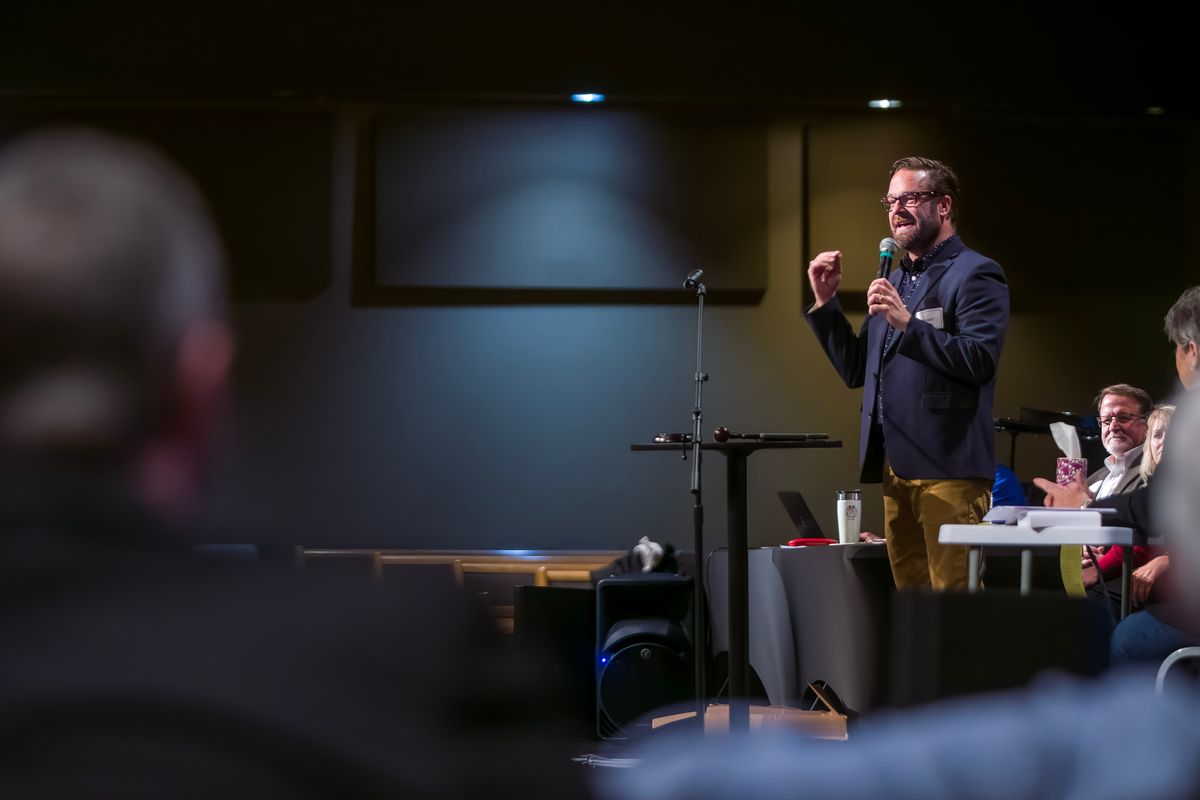Crashing the party: Spokane County GOP moving to the right, Republicans say
Dec. 19, 2022 Updated Mon., Dec. 19, 2022 at 5:04 p.m.

Brian Noble, the new chair of the Spokane County Republican Party, speaks to a crowd of precinct committee officers Dec. 10 at Valley Assembly of God church. (Colin Tiernan/The Spokesman-Review)
Brian Noble has stood at the front of a church countless times, but this time was different.
Instead of preaching to his parishioners, the longtime pastor last week was delivering a speech to nearly 200 GOP precinct committee officers, making a case for why he should be the new leader of the Spokane County Republican Party.
During his five minutes with the microphone, Noble rattled off his political views. Support for the Second Amendment and capitalism. Anti abortion and big government. It was a greatest hits list of the modern-day Republican Party platform, with a plea for civility thrown in.
“We need to have a place of compassion and respect for each other’s differences to move us forward,” Noble said.
Soon after the speech, the precinct committee officers elected Noble in a landslide as their new chairman. The 48-year-old won 128 votes, compared to 62 for runner-up Susan Schuler, a former Liberty Lake city councilwoman who had been serving as the GOP’s vice chair.
Noble’s victory wasn’t the only big change in GOP leadership on Dec. 10. Many of the Republican Party’s new officials are political novices taking the reins from party regulars.
What the leadership shake-up means for the GOP isn’t entirely clear, but Republicans from across the conservative spectrum said the party is moving further to the right.
Kelly Lotze, a moderate Republican who’s spent more than a decade as a party operative, said he believes the far right has taken over the county GOP.
“Literally all 18 board members are what I would deem as far right and, for lack of a better word, extremists,” Lotze said.
Spokane Valley City Councilman Rod Higgins agrees the new party leadership is more conservative but dismisses the far-right and extreme labels. Higgins described the party’s former board as “extreme left” and said Noble’s victory represents a move to the middle or center-right.
Noble said he doesn’t know which way the party will go under his leadership.
The pastor said he wants to avoid extremism but doesn’t intend to push his own ideas or steer the party in any particular direction. The precinct committee officers will set the priorities, he said.
“It’s their vision, their dream and what they want to do,” Noble said. “The chair is there to facilitate, not to dictate.”
Noble’s political resume is short. He first got into politics this year when he ran for the Spokane County Commission against incumbent Republican Mary Kuney.
So far, Noble opponents have garnered more support from elected Republicans than he has.
He was nominated for party chair by Mike Drew and Rob Linebarger, a former Central Valley School Board candidate who strongly opposed mask and vaccine mandates during the COVID-19 pandemic. Schuler’s nominations came from Spokane County Sheriff-elect John Nowels and Jeff McMorris, a policy adviser to the Spokane County commissioners and the brother of U.S. Rep. Cathy McMorris Rodgers.
During his run for Spokane County commissioner, Noble had relatively few well-known financial supporters. Two of his most recognizable donors were Eastern Washington Liberty, a group that argues Eastern Washington should secede from the West Side and form a 51st state, and Caleb Collier, a conservative activist who frequently collaborates with former state lawmaker Matt Shea. Shea was among the dozens of precinct committee officers who gave Noble a standing ovation when he was elected party chair.
Noble has said it’s misleading to note his connections to Collier and Eastern Washington Liberty without also mentioning he’s the CEO of Peacemaker Ministries and the author of multiple books on conflict resolution. He wouldn’t definitively say if he supports splitting Washington into two states.
“The people would have to decide,” he said. “If that’s what the people of Washington State and whoever else has to make that decision decided, then yeah, I’m all for equal representation.”
Brian Steele, Noble’s predecessor as chair, said he doesn’t know what’s in store for the party going forward. Steele did say he’s encouraged that Noble and vice chair MJ Bolt are calling for party unity. Bolt, Eastern Washington’s representative on the state Board of Education, declined a request for comment and directed questions to Noble.
“At this point, I’m going to take Brian at his word,” Steele said. “Both of them are talking the right things.”

Brian Noble, the new chair of the Spokane County Republican Party, speaks to a crowd of precinct committee officers Dec. 10 at Valley Assembly of God church. (Colin Tiernan/The Spokesman-Review)
How to take over a party
There’s a simple playbook for taking over a political party, and Steve Bannon has championed it.
In February 2021, the one-time adviser to former President Donald Trump invited Dan Schultz onto his podcast so his listeners could learn about what Schultz calls the “precinct strategy” – a plan for “Trumplifying” the Republican Party.
“We have to take over the party and there’s only one way to do it,” Schultz, a lawyer from Arizona who is active in the GOP, told Bannon. “The precinct committeemen are the party, the precinct committeemen elect everybody in the party all the way up to the RNC (Republican National Committee).”
Precinct committee officers, commonly referred to as PCOs, are neighborhood-level political leaders who help increase voter turnout, raise money and pick party officials. Some are elected; some are appointed. Many casual voters don’t know they exist.
“They’re one of the most powerful offices that’s unknown,” said Beva Miles, a former GOP district leader and vice chair of Republicans of Spokane County, an organization separate from the official county Republican Party that was formed more than a decade ago by more moderate members of the party. “They make the decisions that rule the party.”
Despite their importance, many PCO positions are vacant. Schultz sees those vacancies as an enormous opportunity.
If strong Trump supporters fill the empty seats, they can transform the party from the ground up and back GOP candidates who support “America First” policies, Schultz told Bannon.
“We can take over the party if we invade it,” Schultz said. “The party is there for the taking.”
Some version of the precinct strategy happened in Spokane County this year, regardless of whether it was Schultz or Bannon-inspired.
Two years ago, the Spokane County Republican Party had about 190 PCOs following the primary election. This year, the number soared to about 250. For comparison, the Democratic Party’s PCO count went from about 150 in 2020 to 110 after the August primary.
Miles, Lotze and Higgins say someone, or a group of someones, led a coordinated effort to fill PCO seats. They all agree the change in party leadership probably couldn’t have happened without it.
Who organized the effort is less certain.
Noble declined to say who was behind it. Several individuals mentioned by Lotze, such as Kim DeLisle, 4th Legislative District Rep. Rob Chase and Shea, either declined or did not respond to requests for comment about who was behind the effort. Cecily Wright, a former party chair, said she generally encourages people to become PCOs but didn’t participate in a coordinated campaign this year.
New PCOs didn’t exclusively fill empty positions. Some took seats from party leaders.
Lotze and Miles, who have been among the GOP’s more active members for over a decade, lost their PCO races during the primary. Their losses are significant not only because they were district leaders, but because they’re viewed as moderates.
Both believe in a “big tent” Republican Party. For Lotze, that means inviting someone in if they agree with 51% of the GOP platform. Miles, a self-described Reagan Republican, said the party needs to welcome diverse views and encourage debate.
She doesn’t think the party is the right place for everyone, though.
“I will not support far-right candidates who align themselves with Matt Shea or the like and who promote white nationalism, racism or any other form of bias,” Miles said.
Lotze said he feels that “the tent pretty much collapsed” when the new party leadership took over this month.
Higgins said he doesn’t think Lotze or Miles are true conservatives and isn’t sorry they’re gone from the GOP leadership. What they see as a loss of ideological diversity in the party, he sees as an end to infighting.
“You now have a definable Republican Party,” Higgins said. “I think good things will come of it.”
The fight for mighty moderates
Leonard Christian said he worries that moving further to the right could hurt the Republican Party.
The soon-to-be lawmaker, who was elected this November to represent the 4th Legislative District, said voters have shown they dislike more extreme candidates regardless of political affiliation. If the GOP strays too far to the right, Christian said, it could have a harder time raising money and getting Republicans elected.
“Mainstream Republicans are not willing to invest in the far-right or far-left mentality,” he said.
Christian said his election to the Legislature proves the voters’ preference for more moderate candidates. The real estate agent narrowly beat incumbent Republican Rob Chase, who has endorsed numerous conspiracy theories, argued for a return to the gold standard and advocated for splitting Washington into two separate states.
Moderate Republicans abandoned Chase when given a choice, Christian said.
“I hate to say it, but I got the hate vote,” said Christian, who acknowledges that Democratic support was also essential for his election. “They’re tired of the far-right garbage.”
Chase did not respond to a request for comment.
Not all Spokane County political races are competitive, but when they are, the two parties have to compete for independents.
Lotze said he doesn’t think Noble and Bolt have shown an ability to appeal to independents. Noble lost his Spokane County Commission race by more than 10 percentage points. Bolt ran for state representative in the 4th Legislative District this year against Republican Suzanne Schmidt and Democrat Ted Cummings, but failed to advance past the primary.
Noble said he doesn’t have a specific strategy for appealing to moderate voters and will defer to the guidance of the PCOs.
“When you listen to the PCOs as a whole, you’re going to end up in the more moderate position,” he said.
Miles may have a few philosophical differences with the GOP’s new board members, but she said she’s hopeful Noble and those around him will fight successfully for conservative causes. She said she’ll be happy if they can keep critical race theory out of schools and get the Washington Legislature to ban abortions after 12 weeks.
Even if the new regime ends up guiding the party in a direction Miles dislikes, she respects their passion.
“They’re showing up to meetings, they’re studying, they’re finding out how the system runs,” she said. “They’ve actually gone above and beyond.”
Local journalism is essential.
Give directly to The Spokesman-Review's Northwest Passages community forums series -- which helps to offset the costs of several reporter and editor positions at the newspaper -- by using the easy options below. Gifts processed in this system are not tax deductible, but are predominately used to help meet the local financial requirements needed to receive national matching-grant funds.
Subscribe now to get breaking news alerts in your email inbox
Get breaking news delivered to your inbox as it happens.
